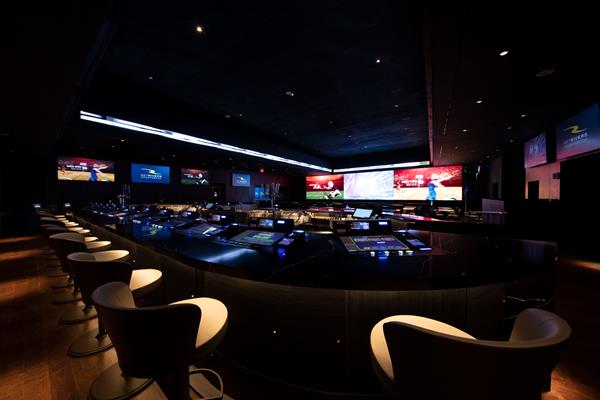Kambi Reports First Quarter Revenue, Profits Up as Company Addresses COVID-19 Impact
Posted on: April 26, 2020, 11:56h.
Last updated on: April 27, 2020, 10:42h.
Sports betting technology company Kambi Group announced on Friday that revenues for the first quarter of 2020 were up by 33 percent over last year’s same time frame. That’s even with the coronavirus wreaking havoc with the sports world in the final weeks of the financial period.

Before COVID-19 caused mass cancellations and suspensions across US and European sporting leagues and tours, the Malta-based company was enjoying a strong quarter. That was thanks, in part, to its growth in the United States.
In January, Kambi opened Penn National’s retail sportsbook at the Hollywood Casino in West Virginia. A month later, it set up five retail sportsbooks with Penn in Mississippi. And just before nearly all sports ground to a halt, the company took the first bets in Illinois and Michigan.
Kambi CEO Kristian Nylén told analysts on the earnings call Friday that the company has more openings lined up in the US once stay-home and casino closure orders are eased.
There can be no doubt Kambi has been setting the pace in the US,” he said. “We are active in more states than any other end-to-end sports betting supplier… We are now active in 10 states, with Colorado to follow shortly. Within these states, we are online everywhere it is currently possible to be and operate more than 30 on-property sportsbooks with approximately 600 betting kiosks in operation.”
While quarterly revenue shot up about a third to €27.9 million ($346.2 million USD) from €21.1 million ($260.5 million USD), earnings before interest and taxes shot up by 162 percent to €6.8 million ($8.43 million USD). The strong quarter comes off a solid 2019 when, for the year, revenues grew by 21 percent.
Kambi in “Good Financial Shape”
Kambi serves as the back-end platform provider for such gaming companies as Penn National, Rush Street Interactive, UniBet, 888 Sport, Seneca Gaming Corp., and DraftKings. The company employs 863 workers around the world.
In the company’s quarterly report, it noted that as it became clear sporting leagues would halt play because of the coronavirus, it provided instruction to its trainers on more obscure sports that were still playing. Nylén said that shift has meant traders are now focused on such events as table tennis and esports until soccer, basketball, and others resume play.
“Of course, things are not ideal right now. But we’re in a good financial shape, and with the resumption of sports and more partner launches, we have a lot to look forward to as we look to regain the momentum shown recently,” he added.
CFO David Kenyon added that the company has put a freeze on new hires, cut marketing and travel budgets substantially, and applied for financial relief in Sweden and Great Britain.
In Sweden, Kambi employees are working about 60 percent of their normal hours, with the government subsidizing worker wages. In Britain, a “furloughing” scheme allows Kambi to maintain about a quarter of their UK employees unable to work. The British government covers those salaries.
Nylén: COVID-19 May Spur Sportsbook Outsourcing
Nylén believes once the recovery period begins from the COVID-19 crisis, it could bode well for companies like Kambi that offer back-end sports betting solutions.
“The costs associated with running, maintaining, and continuously developing a high-quality sportsbook continue to rise, and are only sustainable for a few companies that could possess sufficient scale,” he told analysts. “Therefore, the situation may well prompt those operating a sportsbook without that scale to think carefully about the pros and cons.”
The CEO also shared some of his opinions on the DraftKings acquisition of Kambi rival SBTech. While Nylén referred questions about DraftKings implementation of SBTech to the US sports entertainment company, he added that Kambi will continue to provide the same level of service and products to them.
However, the Kambi leader wondered openly about what DraftKings ownership may mean for SBTech.
“I would expect SBTech’s competitiveness to be severely weakened by being owned by DraftKings,” he said. “So ,if anything, I would say, it looks more positive (for Kambi) now than it has done historically.”
Related News Articles
BlueBet Eyes US Expansion with Aussie IPO Proceeds
Disney Investor Daniel Loeb Changes Mind on ESPN Spinoff
Most Popular
Las Vegas Overstated F1 Race’s Vegas Impact — Report
Vegas Strip Clubs Wrestle in Court Over Animal Names
Mega Millions Reportedly Mulling Substantial Ticket Price Increase
Las Vegas Strip Stabbing Near The Strat Leaves One Man Dead
Most Commented
-
End of the Line for Las Vegas Monorail
— April 5, 2024 — 90 Comments -
Mega Millions Reportedly Mulling Substantial Ticket Price Increase
— April 16, 2024 — 6 Comments -
Long Island Casino Opponents Love New York Licensing Delays
— March 27, 2024 — 5 Comments -
VEGAS MYTHS RE-BUSTED: You Can Buy Legal Weed On the Strip
— March 22, 2024 — 4 Comments
















No comments yet